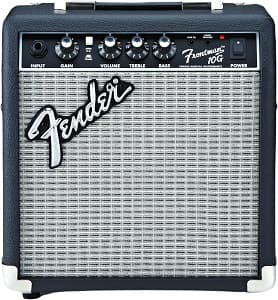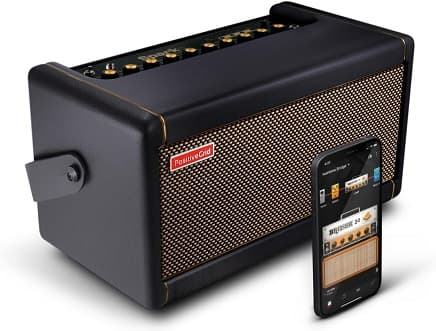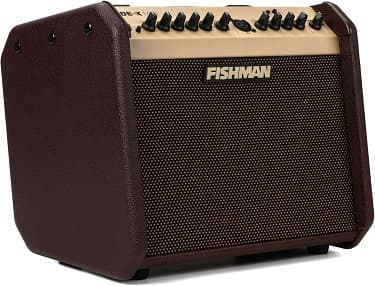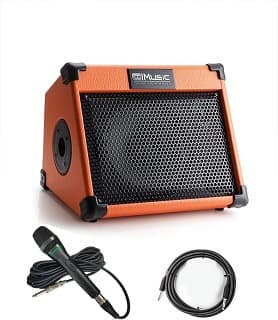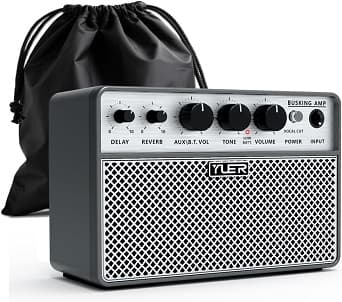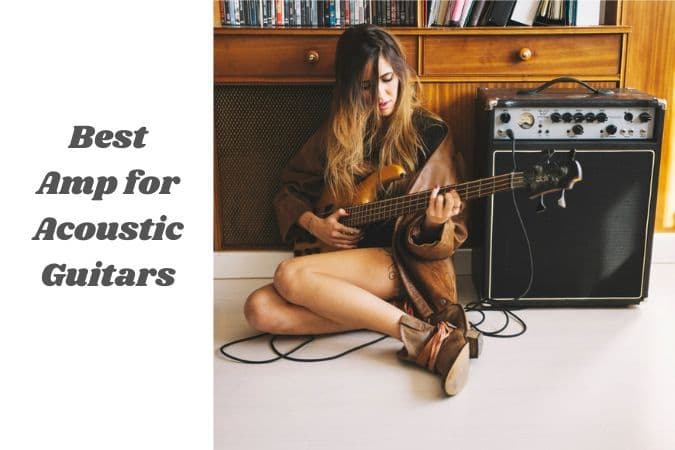
A player requires the best amp for acoustic guitars because it is about more than just creating a loud sound. It’s necessary for coloring the sound, preserving the guitar’s natural warmth and resonance, and adding clarity and projection simultaneously. Indeed, to make your performance lively, you need a quality acoustic guitar amp.
What is an amplifier?
The acoustic guitar amp indicates a device that is used to make an instrument sound louder without altering the natural tone of the instrument. Its function is to help the music reach the audience. Additionally, musicians can utilize an amp to incorporate basic controls and effects, shaping the sound.
Why do you choose an Amp for an Acoustic Guitar?
An acoustic guitar already produces better sounds and tones. But an amp might take your music to a higher level. There are many reasons to choose it, but we highlight a few important ones below:
1. Conserve your natural tone
You can conserve your natural tone because manufacturers design amplifiers to regenerate your instrument’s sound. Without distortion, these remain clarity, dynamics, and warmth intact.
2. Play in front of any audience
Your instrument might not be capable of carrying alone in large halls or outdoor venues. In this case, amplifiers will help you confirm each tune to reach your audience with lucidity.
3. Supportive Vocals and Instruments
You’ll find many amplifiers that come with multiple channels with mic inputs. As a result, these become ideal for small acoustic groups or singer-songwriters.
4. Form Your Sound
Manufacturers offer built-in EQ controls that harmonize your bass, mids, and treble to coincide with the room. In reverse, effects like chorus or reverb affix depth and character.
5. Develop creativity
An amplifier has looping or playback inputs. By utilizing these features, you can practice, layer parts, and explore new ideas.
Top 5 Best Acoustic Guitar Amps
1. Fender 10G Frontman Acoustic Guitar Amp (2311000000)
Yes, first, we’ve included the fantastic product that is the best amp for acoustic guitar for beginners. No question, the Frontman 10G from Fender becomes perfect for practice sessions at home.
This model has a 6-inch speaker and user-friendly controls. Consequently, you can easily adjust tone, volume, and gain. Additionally, you’ll find an overdrive switch to add a punchy rock tone, providing versatility in sound.
The Frontman has lightweight and portable features, including robust construction and classy Fender design. Honestly, it’s the best budget acoustic guitar amp because you won’t spend much but enjoy a high-quality tone.
Pros:
- Easily portable for lightweight
- Superb for the practice
- Best performance for the money
Cons:
- Too little power for live performances
2. Positive Grid Guitar Amplifier Spark 40-Watt
This time, another item is the Positive Combo Amp, which is an updated version. Indeed, the company has introduced it for those who prefer innovative models.
One of this model’s remarkable traits is the smart app integration, so users can access a wide range of effects, tones, and backing tracks using their smartphone or tablet.
The brand adds a 40-watt output to enjoy captivating sound clarity. Moreover, this Combo holds tone customization and smart jam that turn your practice into more interactive and enjoyable.
Pros:
- Smart app integration for tones and effects
- Best-quality 40-watt sound output
- Durable and compact build
Cons:
- Absolute beginners might find it complicated.
3. Fishman Loudbox Mini BT 60-Watt
We’ve put it in our list for those looking for the best amp for acoustic guitar under $500. In truth, the Mini BT is a powerful amplifier that becomes suitable for acoustic musicians and small gigs.
The model features 60 watts, so every note becomes clearer, vibrant, and expressive. What makes it even more unique is the Bluetooth connection. Consequently, players can perform wireless streaming seamlessly.
You’ll find dual channels with dedicated EQ control features, which enable you to shape precise tone for guitar and vocals. If you want to perform in small venues, you can definitely select it.
Pros:
- Standard Bluetooth for wireless streaming
- Powerful 60-watt output for clear sound
- Dual channels with EQ controls
Cons:
- It might not be the best for large venues.
4. COOLMUSIC Acoustic Guitar Amplifier With Mic Input
Many musicians want an amp with a mic, so we’ve come up with an item from COOLMUSIC. This model allows you to run a guitar and a microphone together.
The AC20 includes Bluetooth, so you can use different connecting types without a wire. Plus, it brings 20 watts of output to deliver clear and balanced sound for vocals and acoustic guitars.
The brand adds 3 Band EQ, which helps you meet the needs of various music styles. Also, its built-in effects, such as reverb, confirm natural and echo-like sounds. So, many solo performers or duets select it for their performances.
Pros:
- Bluetooth connectivity and built-in reverb
- Separate controls for guitar and mic
- Clear and balanced sound with 20W output
Cons:
- Not sufficient power for large venues.
5. Yuer BA-10Pro 10W Acoustic Guitar Amp
Are you looking for a travel-friendly mini amp for the travel guitar? You need not look further. The Yuer has launched an amplifier to meet your needs.
This lightweight and battery-powered mini amp provides dual inputs for a microphone and an acoustic guitar. Also, the model adds a high-quality reverb effect to enjoy an ideal vocal tone at all times.
The BA-10Pro includes wireless streaming via Bluetooth 5.3 or AUX, two 1.75″ speakers, and a 10 W solid-state amp.
Plus, other features are a “vocal cut” function to remove vocals from backing tracks, an OTG USB-C interface for recording directly to mobile devices, and about four hours of battery life on its 4000 mAh pack.
Pros:
- OTG Recording and Wireless Connection
- Vocal Function Reverb and Vocal Cut
- Portable Guitar Amp with Reverb and Delay Effect
Cons:
- Not suitable for live performance
How to opt for the best amp for acoustic guitars
There are a few things to consider when choosing everything. Similarly, when selecting an amplifier, you need to consider the following:
1. Specify Your Purpose
First, you consider where you are going to play. If you want to practice at home, a lower-watt amp with simple controls will be sufficient.
Again, portability and battery power will be a vital factor for busking or traveling. In contrast, higher wattage and a direct output might be required for gigging musicians to connect to a PA system.
2. Voice Controls and Effects
These amps include 3-band equalization that assists you in adjusting your sound to the room. On the contrary, they offer built-in effects like reverb, chorus, or delay so that you can add depth and texture, but you won’t require extra gear.
3. Inputs and Channels
Those who are good at singing as well as playing should look for an amp with multiple channels and a microphone input. The reason is that individual EQ controls for every channel provide more pliability in balancing voice and instrument.
4. Power and Wattage
15–30 watts act well in smaller spaces. Again, 30–50 watts is better for the mid-venue. If you want to perform in large venues, you require. 100 watts or more.
5. Feedback Control
Sometimes, live settings provide feedback. In this case, traits such as notch filters or phase switches can assist you in retaining clarity in challenging environments.
FAQ: Best Amp for Acoustic Guitars
Q: 1. Is an amp an essential for an acoustic guitar?
A: It is not always essential. Indeed, for home or small gatherings, the natural sound of the instrument will be sufficient. But when you perform in larger spaces, busk, or play with other instruments, amplifiers can help your voice be heard more clearly.
Q: 2. What does an acoustic amp set apart from an electric guitar amp?
A: Manufacturers manufacture acoustic amps to reproduce the guitar’s natural tone with balance and clarity. In contrast, coloring the sound and adding effects like distortion by using electric amps can be done, which does not go with an acoustic instrument.
Q: 3. How much power can I require from acoustic amplifiers?
A: Indeed, it depends on where you are using it. If there is no PA system, you might need 100 watts or more when you use it for larger audiences. In reverse, for indoor use, 15–30 watts are enough, but 30–50 watts may be required for medium venues.
Q: 4. What traits can you search for in an acoustic amp?
A: The main traits you’ll consider are EQ controls, multiple channels, feedback suppression, and built-in effects like reverb or chorus. Apart from those, battery power and portability will be crucial for mobile players.
Q: 5. May I connect a microphone to an acoustic guitar amp?
A: Sure. You’ll find many acoustic amps that feature a separate microphone input and often have their own EQ controls. For singer-songwriters, it becomes an all-in-one solution.
Final Note: Best Amp for Acoustic Guitars
If you can opt for the best amp for acoustic guitars, your playing style and performance might get altered. Honestly, it is not just a matter of the volume; rather, it is a matter of tone, versatility, and clarity.
